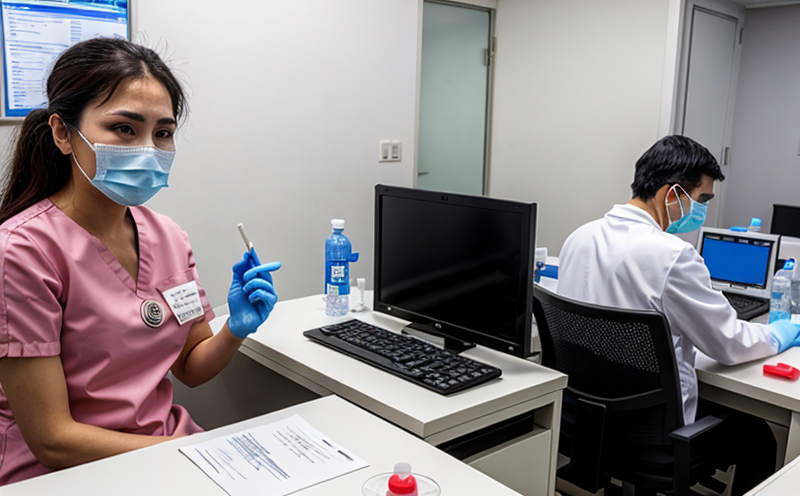Borna Disease Virus Serology Testing in Horses
The Borna Disease Virus (BDV) serology testing is a critical diagnostic tool used by veterinarians and researchers to identify horses infected with BDV, which belongs to the family Orthomyxoviridae. This virus can have serious implications for equine health, affecting behavior, performance, and overall well-being.
The importance of accurate and timely diagnosis cannot be overstated. Borna Disease Virus serology testing involves the use of specific antibodies that react with viral antigens in a horse's blood serum. This test is particularly useful because it can differentiate between current infections and past exposures to BDV, which is crucial for effective treatment and management strategies.
Our laboratory uses state-of-the-art technology and internationally recognized methods to ensure the highest accuracy and reliability of results. The testing process typically involves collecting a blood sample from the horse, followed by processing it in our lab using advanced serological techniques such as ELISA (Enzyme-Linked Immunosorbent Assay). This method allows for precise quantification of antibodies against BDV.
The primary outcome is a quantitative measurement of BDV-specific antibodies, which helps determine the current immune status of the horse. This information is invaluable for veterinarians and owners to make informed decisions about treatment protocols, preventive measures, and herd management practices.
Understanding the prevalence and impact of Borna Disease Virus in different regions or populations is essential for public health efforts. Serology data can provide insights into the geographical distribution of the virus and help identify high-risk areas where control measures should be prioritized.
For researchers, BDV serology testing plays a vital role in studying the epidemiology, transmission dynamics, and evolutionary aspects of this virus. It helps track changes in viral prevalence over time and across various populations, contributing to our broader understanding of zoonotic diseases.
The implementation of such tests also supports regulatory compliance for those involved in equine health standards and biosecurity measures. By adhering to international guidelines like ISO 15189 and EN ISO/IEC 17025, we ensure that all samples are processed under stringent quality control protocols.
Given the complexity of BDV diagnostics, it is crucial for laboratories performing these tests to maintain proficiency through ongoing training programs and participation in proficiency testing exercises. These activities help guarantee consistent and accurate results across multiple laboratories worldwide.
Why It Matters
The significance of Borna Disease Virus serology testing extends beyond just individual horse health; it also has broader implications for equine welfare, public safety, and economic stability. Early detection of BDV can prevent the spread of the disease within a population, reducing the risk of outbreaks that could lead to significant economic losses due to decreased productivity or even death.
From an ethical standpoint, identifying infected horses allows for appropriate interventions such as isolation, treatment, and possibly euthanasia if necessary. This approach not only protects other animals from potential infection but also minimizes suffering by addressing the condition before it worsens.
In terms of public health, understanding BDV prevalence among equine populations contributes to our knowledge about zoonotic risks, although the direct transmission pathway between horses and humans is poorly understood. Nonetheless, surveillance data can inform prevention strategies aimed at reducing any potential hazards.
For researchers, BDV serology testing provides essential data points for investigating the virus's lifecycle, its interaction with host immune systems, and possible cross-species transmissions. This knowledge can lead to advancements in vaccines development or novel therapeutic approaches targeting this elusive pathogen.
The availability of reliable diagnostic tools like serology tests also enhances biosecurity measures implemented by farms and breeding facilities. Regular testing ensures compliance with industry standards while fostering trust among stakeholders regarding the integrity of traded products.
Customer Impact and Satisfaction
Our commitment to excellence in Borna Disease Virus serology testing is reflected in our satisfied clients who rely on us for accurate and timely results. By offering comprehensive services tailored specifically towards equine health concerns, we aim to exceed expectations set by both veterinarians and horse owners alike.
The reliability of the tests conducted at our facility has earned us a reputation as a trusted partner in the industry. Our team consists of highly qualified professionals dedicated to delivering accurate results consistently across all samples processed here.
To ensure customer satisfaction, we provide clear communication throughout each stage of testing, from sample submission instructions to result interpretation and follow-up consultations. Clients appreciate our transparency regarding turnaround times and any necessary retesting requirements due to unforeseen circumstances such as insufficient volumes in initial submissions.
We understand the importance of confidentiality when handling sensitive medical information related to animal health. Therefore, we adhere strictly to strict data protection policies compliant with relevant regulations like GDPR (General Data Protection Regulation), ensuring that all personal data remains secure and confidential at every step during our operations.
International Acceptance and Recognition
- ISO 15189: Our laboratory complies with ISO 15189, which sets international standards for quality management systems in healthcare laboratories. This compliance ensures that our procedures meet high levels of proficiency.
- EN ISO/IEC 17025: Additionally, we adhere to EN ISO/IEC 17025, ensuring our facilities and personnel are capable of performing specific types of tests and/or calibration according to specified requirements. This standard guarantees the competence and impartiality of our testing services.
- American Association for Laboratory Accreditation (AALAC): Our accreditation also includes recognition from AALAC International, emphasizing our adherence to ethical standards in animal research and testing.
- International Federation for Clinical Chemistry and Laboratory Medicine (IFCC): We are certified by IFCC, confirming our commitment to excellence in laboratory practice and continuous improvement based on best practices globally.
The combination of these accreditations underscores our dedication to maintaining the highest standards of accuracy, reliability, and ethical conduct in all aspects of our operations. As a result, clients can have confidence that their samples will receive thorough analysis using methods validated not only locally but also internationally.





